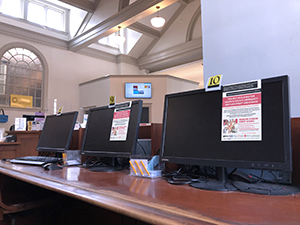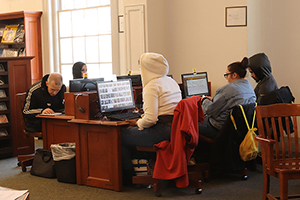A Library member had been waiting a year to receive her Pandemic Unemployment Assistance and regular unemployment payments. At a Madeline Olewine Memorial Library computer terminal, the online unemployment system kept tossing her to a different page.
Library Interim Manager José Colon sat with her to help, tossing in an occasional joke to relieve the frustration and noting that he was learning along with her. They would keep trying until they figured it out – and they did.
The woman was so grateful that she offered to buy Colon lunch. He declined.
“This is why I’m here,” he told her. “This is why I do this, to help you as a member. If I have to take time to assist you, I’m going to do that.”
As Dauphin County recovers from the effects of the pandemic, The Library is helping individual residents get back on their feet, too. It’s all part of The Library’s return to normal. Libraries are open at regular hours and open for discovery.
A vital resource
During the shutdown of 2020 and 2021, The Library pivoted to maintain existing services and enhance those that addressed the moment. Curbside services delivered books and materials to The Library’s patrons hungry for their regular reads and favorite movies.
 The newly created, online BookAdvisor connected members with reading recommendations, personally crafted by Dauphin County Library System librarians. MARCO, The Library’s mobile van, brought cellphone charging stations and computer access to people experiencing homelessness.
The newly created, online BookAdvisor connected members with reading recommendations, personally crafted by Dauphin County Library System librarians. MARCO, The Library’s mobile van, brought cellphone charging stations and computer access to people experiencing homelessness.
While all the online offerings and programs remain, the careful return to normal at The Library’s locations allows economically-disadvantaged member access to the internet services that are essential lifelines – and to the personal guidance needed to navigate the complex bureaucracy of pandemic assistance.
The full reopening will feel a bit different, but The Library’s welcoming feel will not change. Members will no longer be limited to one-hour stays but can remain as long as the doors are open. All COVID restrictions such as social distancing and mask-wearing will remain as long as state and federal authorities recommend them.
 Assistance that connects county residents with pandemic recovery resources has become a vital service. Library staff are trained on helping members use computers and received formal training on the Emergency Rental Assistance Program. So far, most members are taking the paper applications stocked at their local libraries.
Assistance that connects county residents with pandemic recovery resources has become a vital service. Library staff are trained on helping members use computers and received formal training on the Emergency Rental Assistance Program. So far, most members are taking the paper applications stocked at their local libraries.
“We like to say we don’t know what all the answers are, but we know where to find the answers,” says Public Services Director Lori Milach.
Some of The Library’s eight locations are even seeing people referred by pharmacies for help scheduling vaccine appointments.
“This is what we’re here for,” says Milach. “We want to be part of the effort to normalize things. This is why we call ourselves second responders. We’re not the ones who are doing the vaccinations. We’re the place that can help you get where you need to be.”
At Colon’s Madeline L. Olewine Memorial Library, members often say they got the job or filed their claims on time, thanks to The Library.
“In my heart, I truly believe we are the main resource, the main point that is helping many people out,” says Colon. “Most of our members walk here from around the neighborhood, and they have limited access to computers.”
He credits a teamwork mentality with getting the job done. Though Library staff are, by rule, limited to spending 15 minutes with any individual, they will break that rule if they can. If 15 minutes turns to 25, Colon will step out from his office to take over a colleague’s desk duties.
Members respond by saying, “You guys are like family. Everyone here is willing to help.”
“Hearing that from our members makes me proud that our staff is going above and beyond to help them out,” says Colon.
Library members can also look forward to a summer of in-person, outdoor events, especially for children. Pop-up events are being planned and will be publicized via The Library’s social media, website, and Compass, The Library’s printed programming booklet. If COVID rates are down by fall, adult and youth in-person programs could return indoors.
Staff is ready
At McCormick Riverfront Library, members have been grateful for help with understanding the unemployment filing process or overcoming software glitches that have blocked their Pandemic Unemployment Assistance.
One McCormick Riverfront Library member kept receiving messages that her unemployment assistance was approved, but she could not find the funds in her accounts. While she tried to reach customer service by email, Library Manager Lisa Howald sat beside her, working the phone. Finally, they reached someone and learned that the woman’s $7,000 was in an old, forgotten bank account.
 “That was a good moment,” says Howald. “Things can get so disheartening. You’re in a bad place, and you’re trying to get help, and the bureaucracy or the technology or the combination of both makes it so difficult. Just knowing that we can help someone break through all that and get what they need – I know what a relief that can be.”
“That was a good moment,” says Howald. “Things can get so disheartening. You’re in a bad place, and you’re trying to get help, and the bureaucracy or the technology or the combination of both makes it so difficult. Just knowing that we can help someone break through all that and get what they need – I know what a relief that can be.”
Regular visitors to the Madeline L. Olewine Memorial Library “are excited that we’re still open,” says Colon. “They can still come in, and whether they’re checking out DVDs, a book, or getting computer assistance, our members are thrilled that we’re not closed and that we’re open and ready to provide services.”



